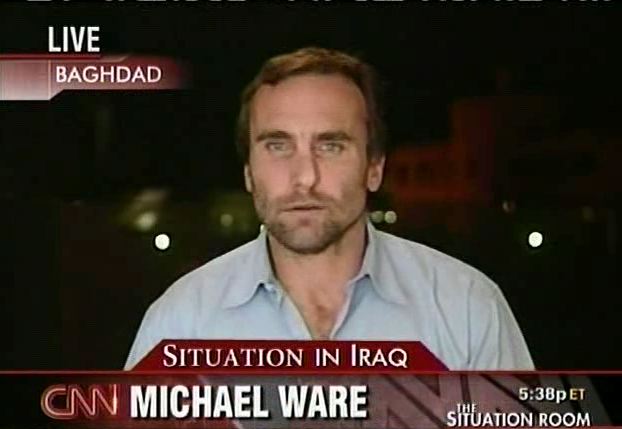AC: "You can restrict the flow, but you shall not stop it."

Click photo to play
Length: 4:34
JOHN ROBERTS: More now on the politics inside Iran, as well as the timing of the allegations against it.
I spoke earlier tonight with CNN's Michael Ware and Christiane Amanpour.
(BEGIN VIDEOTAPE)
ROBERTS: Michael, these explosively formed penetrators or projectiles, are hardly anything new. They have been around since 2005. And Iran has long been suspected of supplying at least the parts for them.
So, why is the United States making such a big point of this now, particularly all of the security and secrecy around yesterday's briefing?
MICHAEL WARE, CNN CORRESPONDENT: Well, the reason that the officials have given for the secrecy -- and that's that the briefing could not be recorded, and the three officials who were present could not be named or identified, except by title, a senior defense official, a senior defense intelligence analyst, and an explosives expert -- was, they said, so that the media could get access to the information that at least one of these men, the intelligence analyst, had.
They said, he cannot be exposed. His identity cannot be revealed. And, if it was to be a public event, we would not have access to his information.
As to the timing, well, that's up to anyone's guess. The military says it took time to collate this information, declassify it, and protect their methods.
They also said that there's been such an upsurge in the use of these weapons that they felt that they were obliged to disclose it. That's their story.
ROBERTS: Yes, there were some sources who were saying that they were worried about authenticating the intelligence, particularly this idea that ties these IEDs to Iran.
Christiane Amanpour, the Iranian government is denying absolutely any involvement in this. Any reason to believe them?
CHRISTIANE AMANPOUR, CNN CHIEF INTERNATIONAL CORRESPONDENT: They are denying it. And they deny it strenuously.
They basically say that they believe that the U.S. is doing it because the U.S. is trying to deflect attention from a very catastrophic situation inside Iraq.
Now, there may be evidence that, you know, certainly I'm not privy to it. But what I can tell you is what you know. And that is, the Iranians do deny it. Now, that's on the official level.
Behind the scenes and on background, a very senior government official, connected, very, very well-connected, has told me that he believes the time is now to start ratcheting back this dangerous escalation of rhetoric, and actually to start finding ways for the United States and Iran to have an engagement and a rapprochement, not from position of dictating or weakness or strength or anything like that, but from a position of mutual interest and mutual benefit.
ROBERTS: Michael Ware, the United States military believes that these parts for these IEDs are coming from the Iranian Revolutionary Guards' Al-Quds division.
What is the Al-Quds division? And what can be done to stop the cross-border traffic of this type of explosive device?
WARE: Nothing. Absolutely nothing. It's very hard. You can restrict the flow, but you shall not stop it.
And the Quds Force, the Jerusalem Force, within the Iranian Revolutionary Guards Corps is its extraterritorials; essentially, its Green Berets on black operations would be a rough equivalent from an American point of view. And, according to U.S. intelligence, they answer not to the armed forces, but directly to the office of Supreme Leader Ayatollah Ali Khamenei himself.
ROBERTS: And, Christiane, even if Iran were to be found to be supplying these IEDs, or even the parts for them, what could the United States really do? During the Russian occupation of Afghanistan, the U.S. was very openly supplying the Mujahedeen with the service-to-air missile launchers to knock down Russian helicopters.
AMANPOUR: To try to stop it, whatever it is, clearly, would need engagement. That seems to be the most logical way to try to figure out what's going on, and try to have some influence on it.
You remember this incredible moment many months ago now, it seems, when the then-U.S. Ambassador to Zalmay Khalilzad was meant to be having talks with Iranian counterparts precisely about this kind of thing, andthen those talks were canceled abruptly, at the last minute.
I think that most people looking in believe that it's got to have -- there's got to be some kind of engagement on this issue, and that it's not going to be stopped militarily.
ROBERTS: And, until there is, it looks like American solders and Marines will keep fighting and dying at the hands of these devices.
Christiane Amanpour in London, Michael Ware in Baghdad, as always, thanks.
